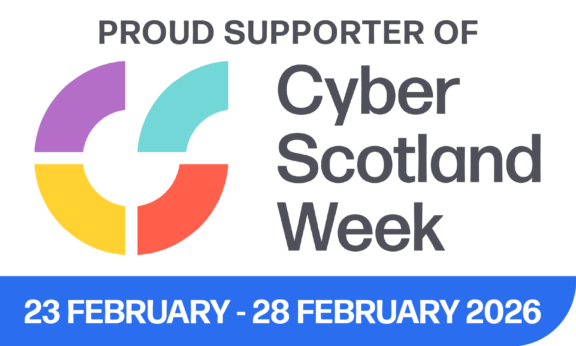
CyberScotland Week – Tips to Embed Cyber Resilience in Your Organisation
CyberScotland Week is back for its eighth year, running across Scotland from 23 – 28 February 2026. This national awareness campaign brings together groups to…
Cyber security is one of the fastest-growing industries, with opportunities across every sector and at every level. But it’s also a competitive space, and whether you’re aiming for your first job, or planning your next career move, it can feel overwhelming where to start.
Here are some key takeaways and tips from our recent webinar on cyber recruitment with Shannon McKechnie from MBN Solutions, and Andrew Dillin at NatWest.
Cyber roles aren’t just technical. Yes, there’s a need for people who can code, analyse data and configure systems, but there’s also huge demand for skills in risk management, communication, project delivery, and leadership. Knowing this can help you spot a role that plays to your strengths, even if your background isn’t purely technical.
For those starting out, entry-level certifications (like Cyber Essentials or CompTIA Security+) or awareness training in areas like cloud security can show employers you are serious about a career in cyber security. Free online resources, open-souce training and community events are all great ways to build basic knowledge.
If you’re considering longer-term qualifications, courses like CISSP or CISM can be valuable, but remember that other ‘soft skills’ will help you stand out. This can be what you learned from travelling, the extracurricular interests you have, or experience you can bring from a different sector.
Employers like to see practical experience. This could be:
If opportunities are limited, don’t wait for them to land in your email inbox. Be proactive. Build your personal brand, follow employers you are interested in and connect with people in the industry you admire.
Communication, problem-solving and teamwork are just as important as technical ability. Employers want people in their teams who can explain risks clearly, challenge decisions constructively, and collaborate effectively.
Show you can think critically. If you are given a hypothetical cyber scenario, how would you approach it? These analytical skills often matter as much as specific technical knowledge.
It’s tempting to jump at the first opportunity, but think carefully about where you want your career to go. Do you enjoy technical, hands-on work, or are you more drawn to strategy and leadership? The skills you develop early on can shape your future pathway.
Remember, not every job will be your ‘forever’ job. Sometimes you need take on a role to build experience and exposure, then move on when the time is right.
Cyber security is a competitive marketplace, so think about how to differentiate yourself.
Cyber learning is constantly evolving. Employers value people who stay curious, adapt quickly, and embrace change. Take advantage of online courses, read industry blogs, and keep up with news about emerging trends, threats and technologies.
Breaking into a cyber security career isn’t easy. But it’s absolutely achievable if you’re willing to be proactive, keep learning and seek out opportunities. Employers aren’t just looking for people with perfect technical knowledge. They want people who can grow, adapt, and bring fresh perspectives to their teams.
So, whether you’re aiming for your first role or planning your next move, build your foundation, grab every chance to gain experience, and keep pushing yourself forward.
Our grateful thanks to both Shannon and Andrew for their input and advice given during our webinar. It was much appreciated.